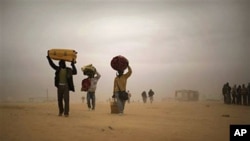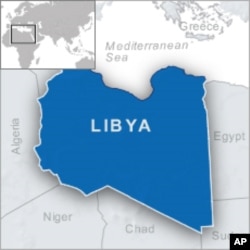Libya's southern neighbors appear ill-equipped to deal with the wave of refugees, mercenaries, and unemployed men that analysts fear is likely to come from the fighting in Libya.
The Niger desert town of Dirkou sits more than 1,600 kilometers due south of Libya's coastline where rebels are fighting with Western support to oust Libyan leader Moammar Gadhafi.
But this remote town, where fuel is scarce, and employment even scarcer, could soon devolve into a humanitarian crisis, analysts fear, as the Libyan war spills southward.
The battle against Gadhafi is likely to send waves of mercenaries and displaced people into towns like Dirkou, all across the Sahara desert region.
London School of African Studies Researcher Jeremy Keenan says none of these countries, nor the international community, is prepared to help towns like Dirkou manage the fallout from Libya's war.
'Primary concern'
Keenan says his primary concern is the mercenaries. Colonel Gadhafi, he says, has recruited between 300 and a few thousand mercenaries from sub-Saharan nations. His army also includes as many as 10,000 troops pulled from Tuareg nomad communities that sprawl across Libya, Mali, Niger, Chad, and Burkina Faso.
If Gadhafi falls, Keenan says, those men will have no place to go but home. "You could easily have 10,000 to 15,000 Tuareg men, armed with fighting experience, in countries which are politically unstable, where they already have grievances of varying degrees and legitimacy. It doesn't take much imagination to realize that these guys could quite easily from a purely physical, military point of view take over the entire central Sahara and northern Sahel, really without much difficulty," he said.
Region of instability
The Sahara is already an region of instability in many areas.
The regional branch of al-Qaida, known as al-Qaida in the Islamic Maghreb, has made millions of dollars kidnapping and ransoming aid workers and tourists in remote areas. The desert also doubles as a vast overland highway for drug smugglers carrying South American cocaine towards Europe.
J. Peter Pham is director of the Michael S. Ansari Africa Center and says many mercenaries from the war in Libya may settle in this area.
"You're going to have these very heavily armed, somewhat trained or battle seasoned, depending on how long they've been in Libya, people returning to possibly their home country, or maybe becoming criminals in other countries," he said. "That's the first order of concern for all these countries, and I would single out Sudan, Chad, Mali, and Niger for concern."
Militaries in those nations have become far more professional over the past decade, Pham says. They are not, however, adequately equipped to confront an influx of well-armed warriors fleeing Libya.
"They may be better prepared to deal with ordinary challenges," said Pham. "This is not an ordinary challenge. This is a wave that's about to hit them."
Moammar Gadhafi, Pham notes, has a deep history of supporting some of the most effective rebels in African history, from former Liberian president Charles Taylor to the JEM rebels fighting against Sudan's government in Darfur.
Wave of the unemployed
Yet the more frightening wave coming towards Libya's southern neighbors may not be mercenaries, but unemployed men.
Former U.S. ambassador to Ethiopia David Shinn, who says the statistics on mercenaries are overestimated, adds that he is far more concerned about what Africans living and working in Libya will do if they return home.
As many as 20 percent of Libya's five million people are sub-Saharan Africans who traveled overland to find work in this oil-exporting nation.
"Some of them have already left, most I suspect are still there because they can't get out, they're just stuck somewhere. To the extent that they return, they add to the unemployment rolls of whatever country they're coming from," said Shinn.
The economies of those countries, he add may be further damaged by yet a third fallout from the Libyan war.
Gadhafi and his government control billions of dollars of investments across Africa, from hotels, gas stations, a chicken farm in Togo, a telecommunications company in Niger, and several mining companies. Shinn says the finances of these businesses will clearly be in jeopardy if Mr. Gadhafi is driven from power or his regime is badly damaged.
Pham of the Ansari Africa Center says the war in Libya will almost certainly bring change to sub-Saharan Africa. He worries that many of the communities that will be affected may be facing disruptive times, and says they should start planning ahead now.













